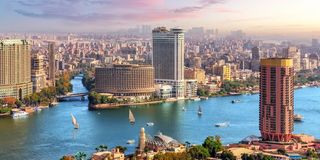The 10 African countries that attracted the most FDI in 2023

Cairo, Egypt
What you need to know:
- Africa faces a sustainable financing gap of up to $1.6 trillion until 2030, hindering the implementation of existing and greenfield projects due to challenging economic dynamics and rising debts.
Nairobi. The International Monetary Fund (IMF) global economic performance projections for 2024 listed 6 African countries in the top 10 fastest growing economies globally, evidence of unprecedented and untapped economic opportunities on the continent. That kind of growth also creates demand for investment.
According to the OECD, Africa faces a sustainable financing gap of up to $1.6 trillion until 2030, hindering the implementation of existing and greenfield projects due to challenging economic dynamics and rising debts.
The continent’s vast natural resources and abundant, increasingly skilled human capital, particularly, make it a magnet for global investors looking to manufacture goods for global markets and the continent's expansive consumer base. With a single trade zone - the African Continental Free Trade Area (AfCTFA) now under development - investing in Africa is also about securing a foothold in one of the world's largest markets for products and services.
A new report from the UN Trade and Development, shows that while FDI inflows into Africa declined by 3 percent to $53 billion in 2023 - consistent with global trends where FDI dropped by 2 percent - the continent nevertheless continues to witness significant expansion in greenfield investments, particularly in the burgeoning clean energy sector.
The following are the 10 African countries that attracted the most foreign direct investments in 2023 according to the World Investment Report 2024.
Egypt - Although foreign investment in Egypt decreased from $11.4 billion in 2022 to $9.841 billion in 2023, the year marked some of the most significant investment announcements, particularly in green hydrogen. This sector is set to remain a magnet for investors, fueled by Egypt’s ambitious green hydrogen strategy, which aims to supply 5-8 percent of the global hydrogen market by 2040.
South Africa - The combination of inflationary pressures and persistent electricity challenges significantly dampened investment inflows into South Africa last year. In 2023, investments dropped sharply to $5.233 billion, a steep decline from over $9.2 billion in 2022. Despite this downturn, South Africa still managed to secure one of the highest shares of investment on the continent.
Ethiopia - Ethiopia, recognized by the IMF as the second fastest-growing economy in Africa with a growth rate of 6.2 percent, follows closely behind Cote D'Ivoire at 6.6 percent. In 2023, Ethiopia attracted $3.263 billion in inflows, slightly down from the $3.6 billion in 2022. The country's recent decision to open previously restricted sectors to foreign investors signals a major policy shift from its 1970s-era investment regulations. This change is expected to boost inflows significantly in the coming years.
Uganda - Uganda has emerged as a prime destination for foreign direct investment (FDI) in recent years, thanks to its stable macro-economic policies, liberalized business environment, strategic location as a logistics hub within the Great Lakes region, and burgeoning regional trade. The country attracted a substantial $2.886 billion in FDI in 2023, nearly matching the impressive $2.9 billion it garnered in 2022. This consistent investment inflow underscores Uganda's growing appeal to global investors.
Senegal - In 2023, Senegal emerged as a leader in West Africa by attracting an impressive $2.641 billion in foreign direct investment (FDI). This surge in FDI highlights the country’s rapid economic growth and the transformative role of foreign investors. A prime example is Senegal's recent landmark achievement of initiating its first oil production at the Sangomar field. Spearheaded by Australia's Woodside Energy, the project underscores Senegal’s burgeoning potential and the pivotal contributions of international partnerships.
Mozambique - In 2023, Mozambique drew in $2.509 billion in foreign direct investment, slightly down from $2.4 billion in 2022. The country's rich natural resource sectors, including gas, coal, and minerals, continue to captivate investors. Recently, Mozambique revamped its investment laws, offering substantial fiscal and non-fiscal incentives to attract more capital. This legislative overhaul is poised to boost FDI inflows even further in the coming years.
Namibia - Post-pandemic, Namibia has seen a significant boost in investment inflows, largely driven by a surge in oil and gas exploration. According to recent reports, the southern African nation attracted an impressive $2.345 billion last year, nearly doubling the $1.07 billion recorded in 2022. Additionally, investments in clean energy projects, including green hydrogen, solar, and wind, are further propelling Namibia's investment growth.
Nigeria - Investment interest in Nigeria is surging after a significant slowdown caused by currency fluctuations and inflation. Recent data reveals that foreign investments more than doubled, to $1.873 billion, a substantial increase from $895 million in 2022. Although this is still below the $3.3 billion recorded in 2021, the potential for growth is immense, indicating strong future prospects for Nigeria.
Cote d’Ivore - According to the latest IMF projections, Côte d'Ivoire boasts the fastest-growing economy, solidifying its status as a prime investment destination. In 2023 alone, it attracted a remarkable $1.753 billion in foreign investments, up from $1.599 billion in 2022. This significant increase underscores a promising future for the nation's economic landscape.
Democratic Republic of Congo - Inflows to the DRC held steady at $1.635 billion in 2023 slightly down from $1.8 billion in 2022. The mining sector, particularly the extractive industries, continues to dominate these investments, reaping the lion's share of the benefits.





